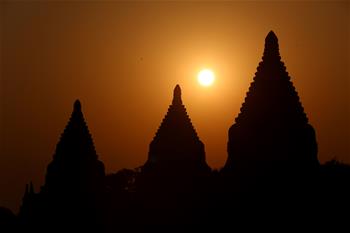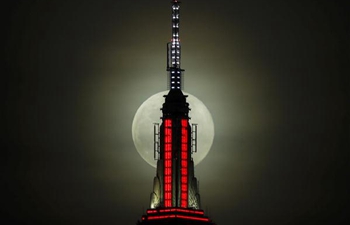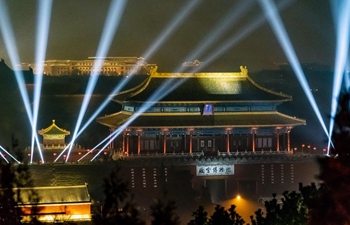BEIJING, Feb. 21 (Xinhua) -- China's original sci-fi blockbuster "The Wandering Earth" has grossed more than 4 billion yuan (595 million U.S. dollars) at the box office since its premiere on Feb. 5.
Experts from the film industry and academia believed the film not only set a landmark for China's film industry but also contributed unique cultural elements from China to the sci-fi film genre.
"'The Wandering Earth' visualized Chinese people's long-lasting national spirit of collectivism," said Wang Xiaohui, head of the State Film Administration, at a seminar held in Beijing Wednesday. "It presented a Chinese version of how humanity may respond to a global disaster."
Adapted from Hugo Award winner Liu Cixin's short story, the film set the storyline against a backdrop of an epic project to propel the planet out of the solar system on a 2,500-year journey in search of a new sun. It focuses on a Chinese astronaut and his emotionally estranged son as they join a global mission to prevent Earth from crashing into Jupiter.
TAKING ROOT IN CHINESE VALUES
"The film is not about conflicts among individuals or different groups or races. It presents human beings as a whole or a community with a shared future for humanity," said Liu Cixin, author of the original short story and executive producer of the film.
"Taking the planet with us on the interstellar journey is a plot different from the Hollywood model of 'escaping from earth.' It manifests the deeply-rooted attachment to the family and homeland in Chinese culture," said Wang Yichuan, dean of the School of Arts, Peking University.
The relationship among family members of three generations depicted in the film resonated with the audience as Chinese families highly value intergenerational bonds, he said.
MILESTONE IN FILMMAKING
Chinese filmmakers had refrained from sci-fi films due to complicated technologies and expertise required for production.
"We had almost no experience in this field," said Han Yan, a film director, adding that the success of "The Wandering Earth" will pave the way for future filmmakers and provide them with experience and confidence.
"In the future, filmmakers will be braver to try new things and explore different genres. That's how China's film industry will become big and strong," he said.
About 80 percent of the film's special effects were produced by Chinese teams.
"Although more needs to be done to match the Hollywood productions, the film demonstrated the technological progress we have achieved in commercial filmmaking," Wang Xiaohui said.
REFRESHING STORYTELLING
Experts also applauded the film for blowing fresh air into the story writing of Chinese fantasy films.
"We used to think Chinese culture preferred to look backward rather than forward. Many local fantasy films set their stories in an ancient fictional background," said Yin Hong, vice chairman of the China Film Association and professor at Tsinghua University. "This one has brought our imagination into the future."
Echoing Yin, science fiction writer Han Song said although rooted in science, sci-fi works are more about expanding the imaginary horizon than introducing scientific progress to the audience.
"The film is helpful for the public to develop a good sense about sci-fi culture," he said.

















